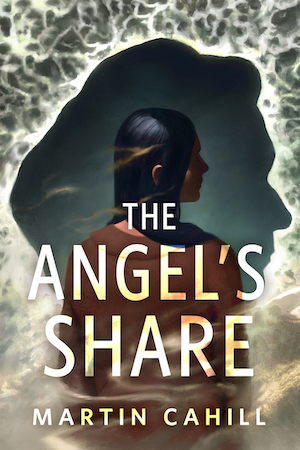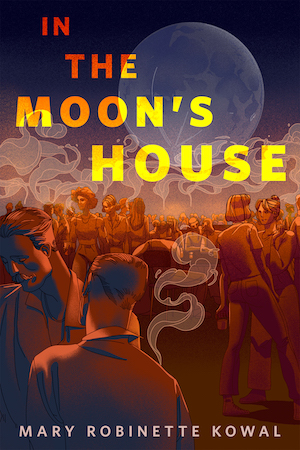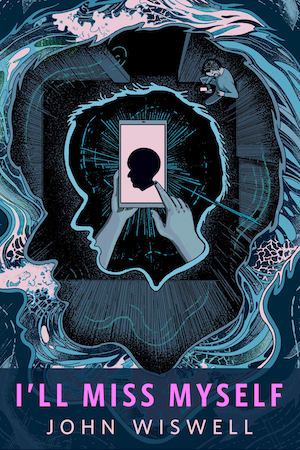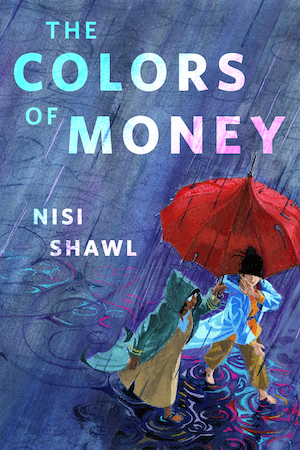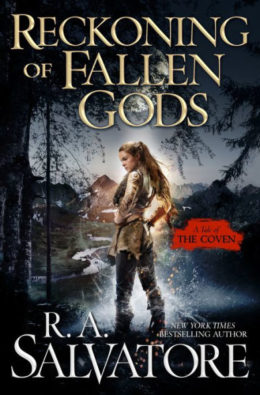Last year’s Child of a Mad God was a glorious return to the world of Corona. I love the world from R.A. Salvatore’s tremendously underrated DemonWars Saga, and appreciated the way he handled the transition to a new series in an old world. It had echoes of the past, but also felt like its own thing. Its sequel, Reckoning of Fallen Gods, returns to the cold, bloodless peak of Fireach Speur, and thrusts readers into a tale of revenge and comeuppance, epic magic, and personal journeys that will have world-changing implications.
The demon fossa is dead at the hand of a young, powerful witch named Aoleyn—but what should be a time of celebration is anything but as Aoleyn is prosecuted and sentenced to death by the very people she saved. If that wasn’t enough, little do they know that the fossa was a safeguard against invasion from beyond the mountains. Now that the gate to the eastern lands is open, the ancient, bloodthirsty empire of Tonoloya has their eyes on the lands beyond Teotl Tenamitl—also known as Fireach Speur, the home of Aoleyn and the Usgar people.
In my review of Child of a Mad God, I praised Salvatore for the way he took the rules and ideas for the magic system established in the DemonWars and subverted reader expectations. I’m fascinated by the idea of a magic system that behaves differently throughout the world—utilized by different cultures in different ways—and Reckoning of Fallen Gods doubles down on this concept. Not only are the magical gemstones used by the Usgar in a way that’s wholly different from the Abellican Church (which holds a monopoly on the magical gemstones in the country of Honce-the-Bear and played a heavy role in the DemonWars Saga), but Aoleyn herself takes it a step further by not only casting aside her tribe’s strict traditions, but actively seeking new and powerful ways to embrace the magic of the gemstones. This illustrates the breadth and possibility of the magic system, but also provides us with a lot of insight into Aoleyn’s personality—she’s a fighter, she doesn’t take shit from anyone, and she’ll carve her own path no matter what it takes.
My main criticism of Child of a Mad God was Salvatore’s use of sexual violence as a plot device and vehicle for Aoleyn’s growth. Thankfully the story in Reckoning of Fallen Gods is able to move past that, and Aoleyn emerges as a character who is motivated and challenged by many conflicts. Just like Jilseponie Ault in the original DemonWars Saga, Salvatore is writing a compelling and nuanced story about a young woman—a born leader—rising up and breaking free of the oppressive shackles of her society. While I still think the use of sexual violence as a motivating factor for Aoleyn’s growth was avoidable, it becomes clear in Reckoning of Fallen Gods that Salvatore never intended to use it as a crutch; instead, as with the novel’s ample spattering of sexual imagery and phallic symbols, it is part of Aoleyn’s journey as she rises not just up to the challenge, but beyond it. She draws strength from within herself, and comes to the realization that the tools of her tribe’s patriarchy can not just be torn down, but also ground to dust. A majority of the novel’s opening half focuses on Talmadge, the traveler who played a large part in Child of a Mad God, and a new group of characters from the Aztec-inspired Xoconai empire. By the latter half of the book, however, Aoleyn returns and undergoes many amazing transformations, some of which are portentous and speak to major implications for Corona through the remaining books in the series.
Buy the Book
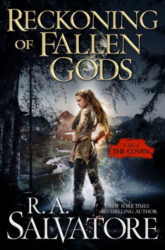

Reckoning of Fallen Gods
Where Child of a Mad God had only echoes of the DemonWars Saga, fans of the earlier series will be happy to know that Reckoning of Fallen Gods has more direct connections to the events following the end of Immortalis, and makes some big promises about coming conflicts that might change the face of Corona as much as anything that happened in DemonWars. It’s a major expansion of scope compared to Child of a Mad God. Where the first book was small and personal, taking place over a long period of time but a small geographical area (more or less, if you set aside Talmadge’s travels), Reckoning of Fallen Gods introduces the aforementioned xoconai, their sun-drenched homeland, and their desire to reclaim the lands beyond the mountains, a destructive path that travels directly through the Usgar homeland and the villages below. Reckoning of Fallen Gods has all the feelings of a larger epic fantasy, and it’s easy to see how the series will grow beyond its beginnings by the time it’s all over and done with.
If its predecessor was about the convergence of culture, then Reckoning of Fallen Gods is about the clash of culture. The Usgar on their mountain, the villagers below, and the xoconai abroad are all vastly different from one another, and as their cultures merge and smash against each other—like swords meeting in battle—sparks fly and wildfires erupt. It’s also about divides within culture—examining what happens when people push back against accepted norms and force change on those around them. From the xoconai seeking to reclaim their world, to Aoleyn refusing to bow to the witches of the Coven, to Talmadge, an outsider, pushing the villagers he has lived among for years to band together, every plot touches on this in some way.
Reckoning of Fallen Gods is a terrific follow-up to Child of a Mad God, and a worthy addition to Salvatore’s Corona universe. It takes many of the elements that made its predecessor sing, and improves upon its flaws. It takes the themes established in Child of a Mad God and expands upon them, folding them into a narrative that feels more epic and consequential, with all the scope of the DemonWars Saga. Whether it’s memorable characters, intense fight scenes, conflicted, complex explorations about the price of power and change, or a magic system that can stand up to any other in the genre, Reckoning of Fallen Gods has everything fans have come to expect of Salvatore’s best books.
Reckoning of Fallen Gods is available from Tor Books.
Read an excerpt from the novel here.
Aidan Moher is the Hugo Award-winning founder of A Dribble of Ink, author of “Youngblood,” “The Dinosaur Graveyard,” and “The Penelope Qingdom,” and a regular contributor to Tor.com and the Barnes & Noble SF&F Blog. Aidan lives on Vancouver Island with his wife and kids, but you can most easily find him on Twitter @adribbleofink and Patreon.


